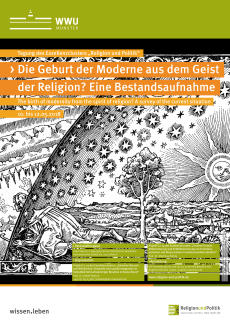“How did the modern world come into being?”
International conference in Berlin on the role of religion in the emergence of modernity

Internationally renowned scholars will discuss the origins of modernity at a conference of the Cluster of Excellence in Berlin in May. The researchers will pay particular attention to the role of religion in the development of modernity. The title of the conference is “Die Geburt der Moderne aus dem Geist der Religion? Eine Bestandsaufnahme/The birth of modernity from the spirit of religion? A survey of the current situation”.
The organisers, sociologist of religion Prof. Dr Detlef Pollack and historian Prof. Dr Matthias Pohlig, are thus asking a question that is as old as it is topical and that has been neglected in more recent times. The researchers write in the conference programme that “contemporary research in the social sciences and the humanities seems to be rather timid about pursuing long-term perspectives and coming up with great narratives”. Modernisation has become a “deprecated and pejorative concept” – also because older modernisation theories have drawn too clear, linear or even teleological lines. However, the problem to which these theories of modernisation reacted has neither been solved nor has it disappeared: “The question as to in which world we live and how this world was created is still on our minds.”
According to the scholars, the question of the origins of modernity cannot avoid Max Weber’s work. With the question he raised about the religious roots of capitalism, a paradigmatic formulation of the genetic connection between religion and modernity is on the agenda. Other modern theories, such as those of Niklas Luhmann, Hans Blumenberg and Charles Taylor, also focus on religion in a particular manner. Was modernity born because the importance of religion diminished or were the disputes with religion an engine of modernity?
The conference will examine which hypotheses and proposals as well as which thought concepts and partial investigations are available, and which problems in dealing with these major questions are currently being discussed in sociology, historical studies and the neighbouring sciences. Thus, it is a survey of possible theories of modernity with particular focus on the role that religion plays in each of them. (exc/sca/vvm)

